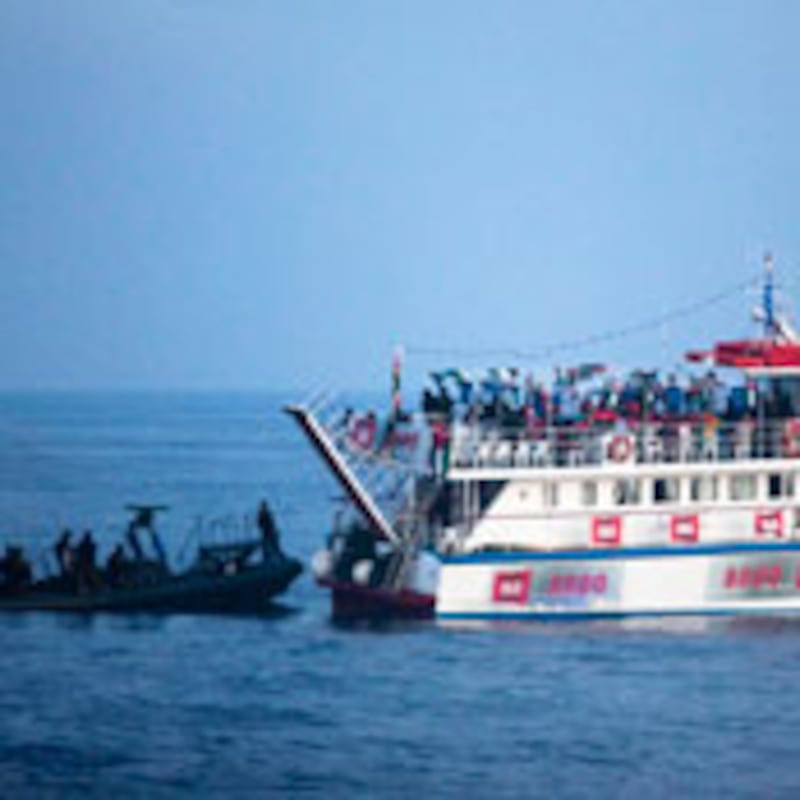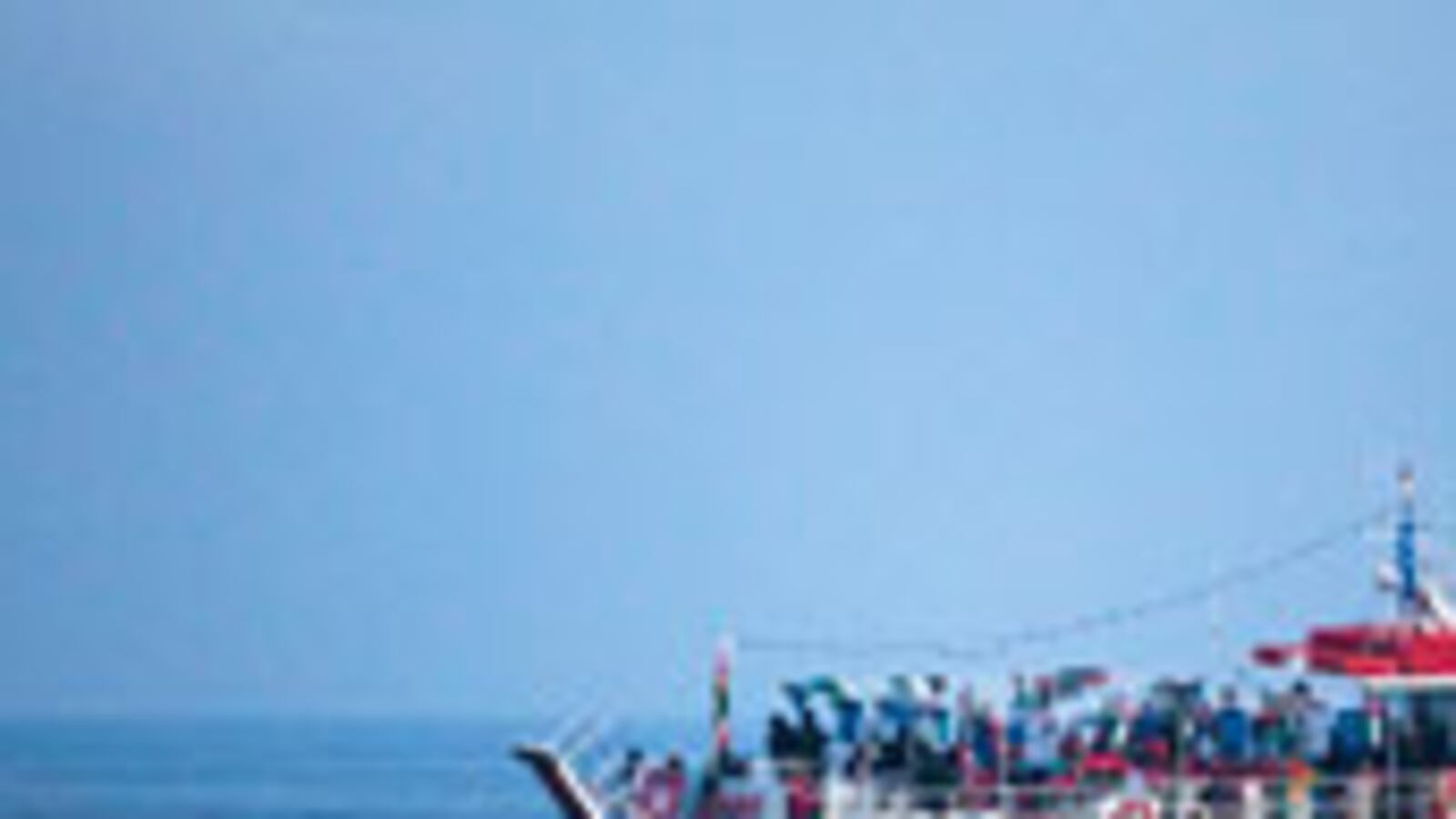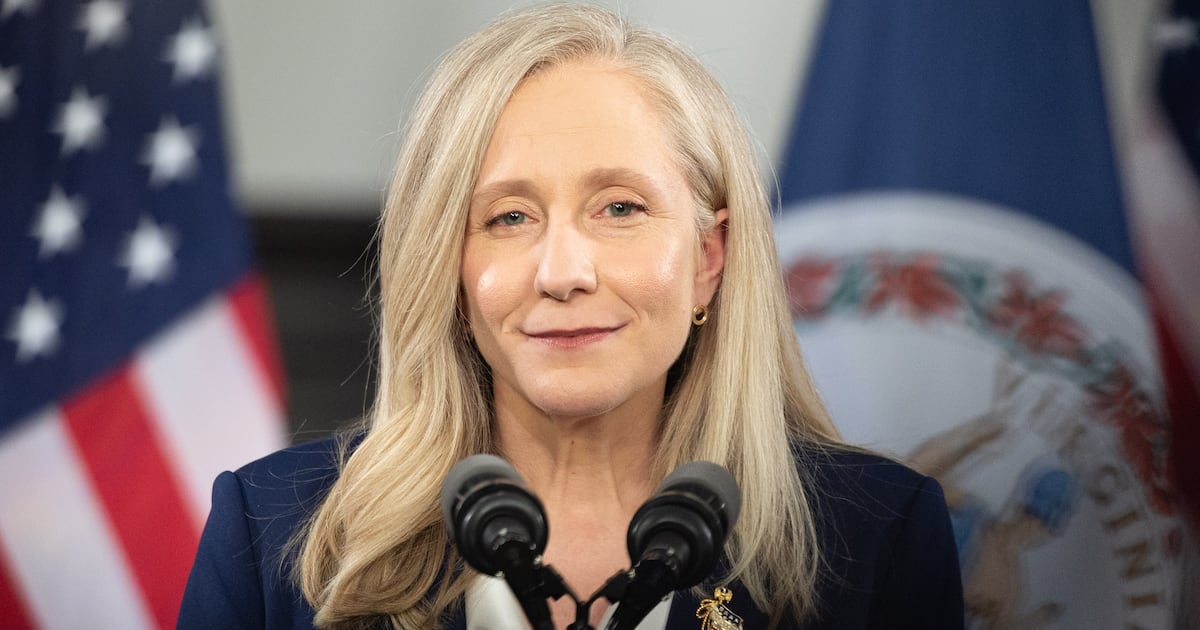
At least nine people have been killed and more than 30 wounded when an Israeli commando stormed the biggest boat of a flotilla carrying 800 humanitarians, peace activists, and aid workers. The flotilla was trying to break through the three-year blockade put in place by Israel after Hamas won Palestinian parliamentary elections in 2006 and seized control of Gaza. The ships were carrying some 10 tons of humanitarian aid. The commandos boarded the ship from helicopters at 4 a.m. Video from a Press TV reporter, who can be heard clearly shouting, “We are being attacked in international waters,” and audio from Paul McGeough, a reporter for the Sydney Morning Herald, show that the ship was boarded while still in international waters. The last known coordinates of the flotilla was latitude: 32.64113, longitude: 33.56727—approximately 65 miles off the coast of Netanya. Israeli police have also imprisoned 16 passengers.
Israeli spokesman Mark Regev said he was confident that the aid workers opened fire first on the commandos. But the aid workers have noted that all the ships were searched at port and no weapons were found.
Israeli spokesman Mark Regev said he was confident that the aid workers opened fire first on the commandos. But the aid workers have noted that all the ships were searched at port by both the Turkish and the Cyprus governments and no weapons were found. Video of the siege shows some of the passengers armed with marbles and slingshots.
Prime Minister Benjamin Netanyahu has given his full support to the operation but has cut short a trip to Canada and canceled completely the meeting that was to take place on Tuesday with President Obama at the White House. Last June, Obama sent a note to the Israeli government officially protesting the blockade and demanding that the border crossings into Gaza be opened to facilitate reconstruction. The U.S. demanded that the Israelis allow more food and medicine into the territory, that cash transfers to banks in the Gaza Strip be permitted, and that construction materials such as cement and iron be allowed in.
• Read The Daily Beast's complete coverage of the crisis in Israel.The names of the dead are not yet known, but passengers aboard the ships included retired U.S. diplomats Amb. Edward Peck and Col. Ann Wright, Nobel Peace Prize laureate Mairead Corrigan-Maguire, and former U.N. Assistant Secretary-General Denis Halliday, as well as humanitarian aid and human-rights workers, several MPs from Ireland, Germany, Sweden, Turkey, Malaysia, and Palestinian members of the Knesset.
This is not the first attempt by the group, known collectively as the Free Gaza Movement, to break through Israel’s blockade. In the summer of 2008, the organization set sail from Cyprus on two small wooden fishing boats carrying 44 activists from 17 different countries. That mission successfully docked at Gaza—the first international ships to do so since 1957. Bolstered by their initial success, leaders of the Free Gaza Movement organized four more successful trips in 2008, transporting tons of aid and dozens of United Nations workers, international activists, and members of European parliaments to the Gaza Strip.
But circumstances changed after the devastating war in December of 2008 between Israel and Hamas (Operation Cast Lead, as the Israelis called it). When the Free Gaza Movement organized an emergency delegation to deliver three tons of medical supplies and a handful of doctors and surgeons to Gaza, they were intercepted by the Israeli Navy, which rammed their ship, almost sinking it. In January 2009, the group bought another ship and once again set sail to Gaza. Once again they were turned back by the Israeli navy. Last June, the organization tried a third time to break through the blockade, this time taking with them Nobel Peace Prize winner Maguire and former U.S. Congresswoman Cynthia McKinney. The Israeli navy boarded that ship, confiscated the materials on board, arrested the passengers, including Maguire and McKinney, and detained them in an Israeli prison for a week. Although the ship was never returned, the Israeli government claimed to have delivered the medical supplies on board to Gaza, though all the other material, including the food, toys, and reconstruction material were seized and, presumably, destroyed.
The Israeli government has instructed the Free Gaza Movement to try to deliver its supplies through official channels. But considering that those channels are strictly controlled by the government itself, it is difficult to take the suggestion seriously. If such “official channels” were actually effective in delivering aid to the Gazans, then there would not be the massive starvation and malnutrition that we are seeing today in Gaza.
Then again, according to the Israeli government, everything is just fine in Gaza. No need to worry. Israel’s Defense Minister Ehud Barak has made the extraordinary claim that there is absolutely no shortage in humanitarian aid to the Gazans and that food and supplies are regularly and freely transferred to the area.
That will come as a surprise not only to the hundreds of thousands of starving Gazans living on piles of rubble that used to be their homes, but to just about every single human-rights and international aid organization in the world, including the United Nations, all of which have repeatedly reported that the blockade is causing extreme hardship, severe malnutrition in children, and increased poverty in Gaza. The World Health Organization recently passed a resolution demanding that Israel end the blockade, claiming that it has caused a devastating shortage of medicines in the Gaza Strip. (Predictably, the United States opposed the WHO resolution, saying that it “stirred up tensions.” Heaven forbid!)
Amnesty International has written numerous reports about how the blockade has destroyed the livelihoods of Gaza’s farmers and fishermen and limited access to medical care. The U.N.’s Association for International Development Agencies has documented the disastrous impact of the blockade on Gaza’s health services. According to one report, long delays for those seeking medical treatment in Israel caused the deaths of 28 people last year alone. The Vatican has called Gaza “one big concentration camp.” The U.N. Secretary-General Ban Ki-moon stated that the blockade has imposed “unacceptable hardships” on innocent civilians while “empowering extremists.” Former U.S. President Jimmy Carter, who has called the blockade a “crime and an atrocity,” echoed Ban’s statement. “I think politically speaking [the blockade] has worked even to strengthen the popularity of Hamas and to the detriment of the popularity of Fatah,” Carter said.
Confronted with these statements and statistics, the response of the Israeli government has been as predictable as it is absurd. After all, all of these international aid and human-rights organizations are against Israel, didn’t you know? Amnesty International is “borderline anti-Semitic,” as Abraham Foxman of the Anti-Defamation League has declared. Human Rights Watch has an “anti-Israel bias,” according to AIPAC. And please don’t get Israeli politicians started on the United Nations! Whatever criticisms these organizations have against Israel are obviously biased and need not be taken seriously.
As to why continue the blockade in Gaza? Well that’s an easy question for the Israeli government to answer. “Hamas, which rules Gaza, is a terror organization supported by Iran,” said Defense Minister Barak. “It smuggles weapons and rockets with the sole purpose of harming Israelis, as it has done many times in the past.”
OK, fine. Hamas is bad. We get it. But what about the rest of the 1.5 million men, women, and children living in what has become the most densely packed region on earth? How can the cutting off of food, medical supplies, gas, and electricity to the entire population of Gaza be understood in any other way except as an act of collective punishment?
Despite the unprecedented humanitarian crisis facing Gazans, Israel’s blockade has gotten very little international attention. Despite a promise by the international community to pledge over $4 billion of aid to help rebuild Gaza in 2009, almost none of that money has reached Gazans. Most Americans, it seems, could not care less about what is taking place in Gaza. Ask the average pundit on TV about it and the response will inevitably be, “Hamas.”
End of conversation.
And yet, do we not all have a moral obligation to put politics aside and stand up for the suffering of our fellow human beings no matter where they are? Are we not obligated to work toward overturning the profoundly immoral policies that have made the situation in Gaza intolerable for its inhabitants? And if the world’s governments are not willing to take action to address this unprecedented crisis, then does it not fall on the citizens of the world to do something about it?
“When the tsunami hit Indonesia, the world came together to provide aid for those affected,” said Ramzi Kysia, a volunteer who has been with the Free Gaza Movement since 2006. “When the earthquake hit Haiti, again, the world came together to help those who were suffering. And yet what we have in Gaza is a man-made disaster, a man-made humanitarian crisis. But it is every bit as bad as any natural disaster.”
Reza Aslan is author of the international bestseller No god but God and How to Win a Cosmic War (published in paperback as Beyond Fundamentalism: Confronting Religious Extremism in a Globalized World). Follow him on Twitter and Facebook.






